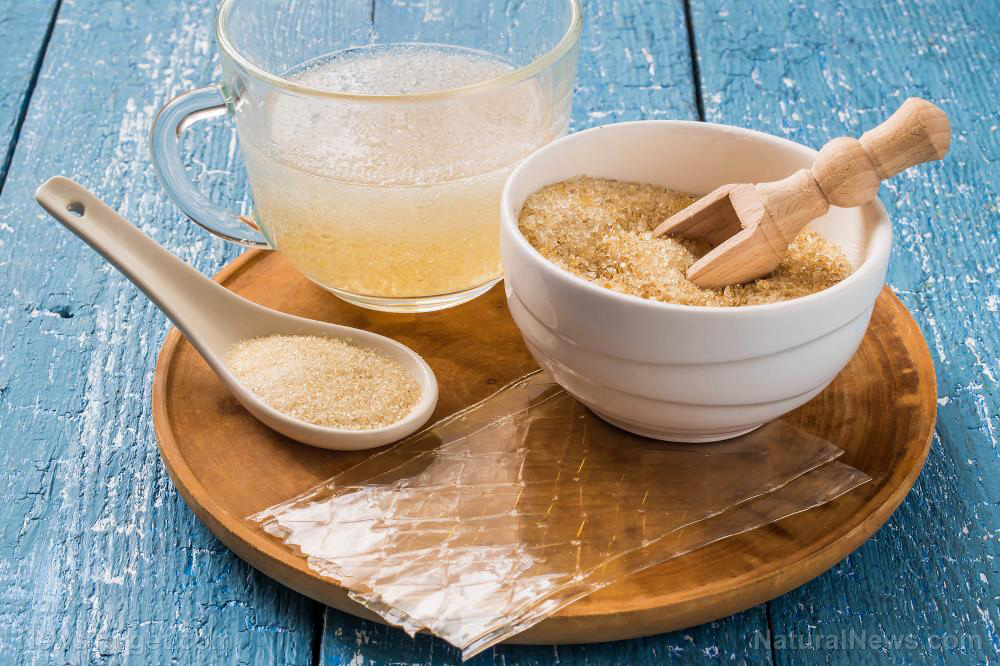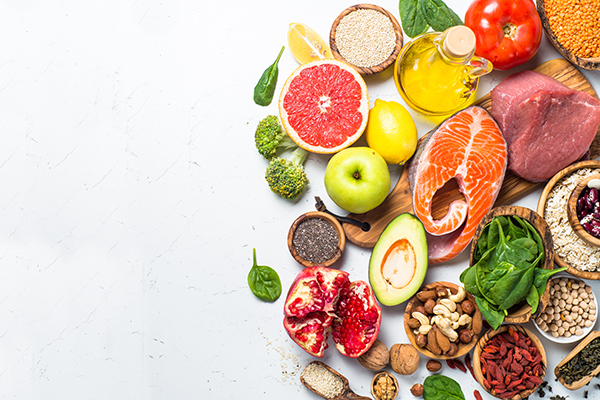Boost longevity with a cup of delicious cold brew coffee (Recipes included)
12/01/2022 / By Rose Lidell

Coffee itself is good for you, but it sometimes gets a bad rap because of iced coffee drinks that often contain too much sugar and many additives.
According to research, drinking one or two cups of coffee offers many benefits. It can even help boost your longevity.
How can coffee boost your longevity?
The journal Annals of Internal Medicine reported news about two large-scale longitudinal studies completed in 2017. One of the studies, which involved 10 European countries and over half a million people followed for more than 16 years, had very convincing results.
The results of the first study showed that the volunteers who drank the most coffee had the lowest risk of dying of all causes. The men’s risk was reduced by 12 percent while the women’s risk was reduced by seven percent.
Researchers also found that higher consumption of coffee was associated with lower risks of death, particularly mortality due to digestive and circulatory diseases.
In women, high levels of coffee consumption were linked to reduced A1c levels and reduced C-reactive protein levels.
In the second study, scientists from the University of Southern California tried to learn more about the benefits of coffee consumption among an ethnically diverse group of volunteers. The people involved in the study were aged 45 to 75 and were followed for almost 20 years.
The results were similar to the findings of the first study: Higher consumption of coffee was linked to a lower risk of death, notably from different types of cancer.
Both studies also suggested that coffee might be protective, but it wasn’t because of the beverage’s caffeine content.
Coffee contains polyphenols and other bioactive compounds with beneficial antioxidant properties. Research shows that coffee may help reduce insulin resistance, inflammation and biomarkers of liver function due to these compounds which are unrelated to caffeine.
Additionally, coffee contains xanthines or chemicals that can inhibit xanthine oxidase. This is the enzyme required for the production of uric acid.
In a third large study, scientists from the University of British Columbia and Harvard University analyzed data gathered from 14,758 volunteers in America who enrolled in the third National Health and Nutrition Examination Survey.
The findings pointed to an inverse relationship between coffee consumption, both caffeinated and not, and uric acid levels. Uric acid was found to decrease with increasing coffee intake.
The third study’s findings eliminated other factors that could have skewed the results, like the participants’ weight, alcohol consumption and diuretic use. This relationship wasn’t observed between tea consumption and uric acid.
If you’re trying to avoid coffee because of its caffeine content, you can drink decaf to help reduce your uric acid levels.
Uric acid levels and hyperuricemia
In Chapter 5 of Dr. David Perlmutter’s book “Drop Acid,” he discussed a meta-analysis of 19 studies that revealed increased uric acid levels among coffee-drinking women. However, the findings didn’t translate to any negative effects and it did not increase the risk of gout.
The authors explained that future randomized controlled trials can help experts understand the potential differences between men and women in terms of their “risk for hyperuricemia and gout within the context of coffee consumption.”
And while there was a slightly increased risk of hyperuricemia observed among the women who drank coffee, it’s possible this may have been an “artifact” or an inconsequential finding due to how the authors made their calculations. For the meta-analysis, the researchers analyzed data from several studies that were conducted differently.
The research suggests that a sufficient body of data beyond this study has continued to prove the link between coffee consumption and a reduced risk of hyperuricemia and gout in both men and women.
Considerations before drinking coffee
Before you consume coffee, it’s best to confirm that it doesn’t cause any adverse reactions or allergies.
If you are limiting your caffeine intake or if you are sensitive to caffeine, you can still reap the acid-reducing benefits of coffee by opting to drink decaf.
Most Americans consume a couple of cups of coffee a day, but you have to drink coffee at the right time to make sure it doesn’t affect your sleep quality negatively.
To ensure that you get enough sleep after enjoying a cup of joe, switch to decaf coffee or caffeine-free teas in the afternoon or around 2 p.m. Limit your caffeine consumption to only 300 mg to 400 mg per day or three to four cups (eight ounces) of coffee.
Those with high blood pressure or other heart problems should avoid high levels of caffeine.
If you are pregnant or nursing, consume even less caffeine or avoid it altogether since drinking high doses of caffeine may cause complications during pregnancy.
Keep in mind that at high doses, caffeine can produce common side effects such as:
- Diarrhea
- Increased breathing rate
- Increased heart rate
- Muscle tremors
- Nausea
- Sweating
Withdrawal symptoms can occur if you stop taking caffeine after using it regularly for a long time. These symptoms can include:
- Bad moods
- Headaches
- Low energy levels
- Sleepiness
DIY cold brew iced coffee
Iced coffee and cold brew coffee are two different things. Iced coffee is made with coffee that is brewed with ground coffee beans and hot water. Once done, the hot brewed coffee is poured over ice and served cold. Iced coffee is more acidic with a more bitter taste.
Meanwhile, cold brew coffee is made with coffee that is brewed with ground coffee beans and cold water over a longer period of time, anywhere from 12 to 24 hours, depending on how strong you want your coffee to be.
The result is called “cold brew coffee concentrate” which is then poured over ice and diluted with water if the concentrate is too strong for you. Cold brew coffee is much more caffeinated, but compared to ice coffee, it is also less acidic and has a smooth, mellow taste.
Try making cold brew coffee if you have a sensitive stomach. This beverage is sweeter than a classic hot brewed coffee, but it’s a healthier drink if you’re cutting down on your sugar intake.
You will need the following supplies:
- Cheesecloth or a nut-milk bag
- A French press, a large jug or jar
- A wooden spoon
Ingredients for 5 cups/servings:
- 5 Cups water
- 1 Cup good quality ground coffee beans, ground coarsely
- Ice cubes (If you don’t like watered-down coffee, freeze leftover coffee in an ice cube tray.)
Preparation:
- Combine the coffee grounds and water in a French press. Stir with a spoon.
- Cover the coffee mixture and let it sit for at least 12 hours in the refrigerator. Refrigerate the coffee longer if you prefer a stronger brew.
- Remove the coffee from the refrigerator and stir with a wooden spoon.
- If you don’t have a French press, strain the coffee through two layers of cheesecloth over a large bowl or jug. You can also use a nut-milk bag.
- Add several ice cubes to a glass and pour one cup of the cold brew coffee on top.
- Add milk, sugar or mixings.
- Store the cold brew coffee in the fridge for up to two weeks.
Raw cacao almond cold brew coffee
If you love good coffee, try Perlmutter’s recipe for raw cacao almond cold brew coffee.
Ingredients for 2 servings:
- 16 ounces cold brew coffee
- 3/4 Cup unsweetened almond milk
- 1 Tablespoon raw cacao powder
- 1 Teaspoon granulated allulose or monk fruit to taste
- 1/2 Teaspoon ground cinnamon
- 1/4 Teaspoon ground cardamom
- A pinch of sea salt
Preparation:
- Get a small bowl and whisk the almond milk, cacao, cardamom, cinnamon, sweetener and salt.
- Pour the cold brew coffee into a serving pitcher and add the almond-milk mixture.
- Stir and serve over ice.
Drink coffee moderately to lower your uric acid levels and boost your longevity.
Watch the video below to know more about the health benefits of cold brew coffee.
This video is from the Frozen In Time channel on Brighteon.com.
More related stories:
Coffee without the jitters: Here’s all you need to know about decaffeinated coffee.
California overturns ruling on coffee warnings: There is no link between coffee and cancer.
Decaf vs. regular coffee: What are the different health benefits?
Sources include:
Submit a correction >>
Tagged Under:
antioxidants, brewed coffee, caffeine, coffee, cold brew, cold brew coffee, food is medicine, functional food, healthy drinks, longevity, nutrients, nutrition, organics, prevention, recipes, tips
This article may contain statements that reflect the opinion of the author
RECENT NEWS & ARTICLES
AgingSecrets.News is a fact-based public education website published by Aging Secrets News Features, LLC.
All content copyright © 2018 by Aging Secrets News Features, LLC.
Contact Us with Tips or Corrections
All trademarks, registered trademarks and servicemarks mentioned on this site are the property of their respective owners.




















